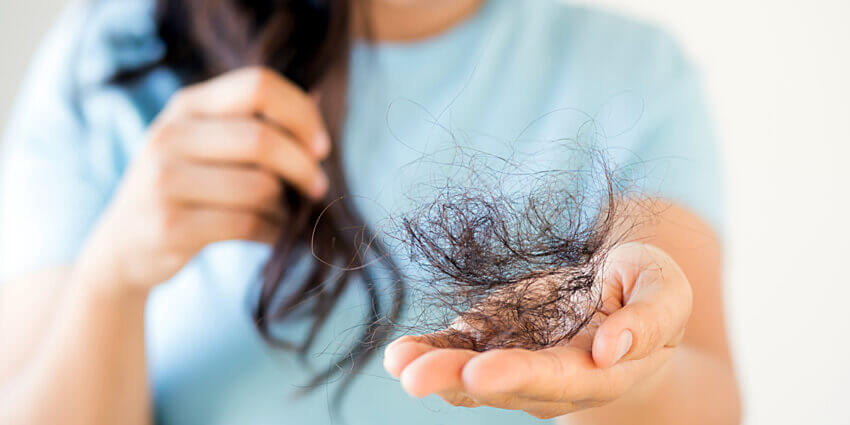It is well known that SIBO and IBS can cause hair loss. Just Google “SIBO hair loss”, you’ll find lots of references. Histamine intolerance (or MCAS) can also cause hair loss (this is often related to SIBO). But “why” do these conditions cause hair loss? Knowing why is important as the treatments may temporarily worsen the hair loss! But then things get much better.
Let me start by saying that certainly not all hair loss is due to SIBO, IBS, MCAS or Leaky Gut, but if you have one of these conditions there is a good chance they are at least contributing to it! This article will cover all of these causes and what you can do about them.
During COVID-19 we’ve heard a lot about “cytokines” because many people died from the “cytokine” storm, not the virus itself. Cytokines consist of a number of substances created by our immune system, these are used for signalling to regulate immune functions and inflammation (what does this have to do with hair loss? I’m getting there). With COVID-19 the body feels it is under an all out attack from the virus and produces certain cytokines to attack it. The “cytokine storm” happens when it over produces these cytokines and produces them longer than it needs to. This causes massive inflammation and this can cause the body to attack its own cells (an autoimmune type response), including hair follicles.
“cytokines together accelerated intra-follicular apoptosis (cell death) after 6 h by doubling the number of apoptotic cells per hair bulb, compared with the effects of TNF-alpha or IL-1beta alone.” — PubMed ID#11069516
Many external factors can trigger the body to release cytokines (including histamine). One of the major ones is an endotoxin called “lipopolysaccharide”, or LPS. This toxin is created by certain gram-negative bacteria; since this bacteria is releasing a toxin most are not considered beneficial (or probiotic). LPS at higher levels can be very dangerous, at lower levels (such as with SIBO) it can still cause a wide range of symptoms; including hair loss.
When LPS leaves the gut and enters the bloodstream it is known as “endotoxaemia”. LPS is mostly released by bacteria when they die as LPS makes up the outer shell of gram-negative bacteria. Often the symptoms of LPS worsen during treatment; this is because they die at a much faster rate and in a minority of people the liver may not be able to keep up with detoxification. This treatment can be from antibiotics or natural kill supplements. Some people experience die-off symptoms and temporary hair loss during treatment, while others do not.
“Endotoxaemia is a pathological condition that results from increased intestinal permeability… (Just) As particular bacterial species assist in maintaining gut epithelial integrity, a severe intestinal dysbiosis can eventually result in permeability of the gut, with LPS reaching the blood stream, being transported to the liver, and worsening the condition” — PubMed ID#PMC6186019
To make matters worse, LPS can cause intestinal permeability, opening its own doorway to the bloodstream. Liver disease, or even a poorly functioning or over worked liver, can also lead to increased intestinal permeability. If a person has any leak gut the first thing they should do is stop drinking, as alcohol can worsen leaky gut and impede the liver. When LPS (again, from gram-negative bacteria) cross over into the systemic environment it stimulates pro-inflammatory cytokines to be produced by the immune system.
Many research studies on alopecia (hair loss) use LPS to stimulate hair loss in order to test theories or treatments (e.g. PubMed ID#PMC3792195, #PMC6737896, #PMC7013965, etc.), This is because inflammation (in this case caused by cytokines) is the most common cause of alopecia; inflammation leads to the autoimmunity that attacks hair follicles. There is no doubt that LPS causes hair loss through the stimulation of pro-inflammatory cytokines.
“Micro-inflammation has been well described in AGA (androgenetic alopecia) with the occurrence of pro-inflammatory cytokines, T-cell and macrophage infiltration and perifollicular sheath fibrosis evident in the progress” — PubMed ID#PMC6584672
Bacteria that produce lipopolysaccharides (LPS) (such as Escherichia coli (E.coli), klebsiella, and enterobacter strains, the most common SIBO strains) in the gut have to pass through the small intestinal wall (just like nutrients do) to enter the bloodstream. Normally the “tight junctions” can prevent most LPS from passing through, while still allowing nutrients to pass. If there are large amounts of this bacteria in the gut the LPS toxin will damage the intestinal tight junctions and then pass through. In other cases the tight junctions may already be compromised (through gluten sensitivity, celiac, medications, excess histamine, excessive alcohol, etc.) Once LPS enters the bloodstream it is the job of the liver to clear it out. However, people differ in their ability to clear LPS and the longer LPS stays in the blood the more damage it can cause.
LPS that stays in the intestine is rarely a problem, it is when it enters the systemic environment (starting with the bloodstream) that it causes trouble. LPS producing bacteria in the colon are also rarely the cause of trouble; LPS producing bacteria normally inhabit the colon and the colon has strong defenses against it. But when we have SIBO the LPS is produced in the small intestine, and it is much more vulnerable than the colon or stomach. If SIBO is not addressed quickly it will most likely lead to inflammation, leaky gut, and various other conditions (such as alopecia).
So to summarize. SIBO bacteria often produce LPS, LPS causes inflammatory cytokines to be released, and these cytokines (over time) can cause hair loss. The good news is this type of hair loss is non-scarring so it is usually temporary. Get rid of the SIBO and the hair grows back!
To make matters worse MCAS (Mast Cell Activation Syndrome, often called histamine intolerance) can also cause (and worsen) this temporary hair loss. In people with MCAS 15% were shown to also experience hair loss (compared to control groups, see PubMed ID#PMC5341697) MCAS is often caused by the same bacteria that produce LPS. These strains not only release histamine, but the LPS they produce triggers our immune system to release its own histamine. To add insult to injury LPS can also damage the cells that produce the enzyme DAO that breaks down histamine in the gut! This can lead to the inappropriate mast cell activation syndrome (MCAS).
“studies have suggested the existence of a neuroimmunologic “brain-hair follicle” axis, in which mast cells have been implicated as an important link between the nervous system and immunologic system… at the distal end of the “brain-hair follicle” axis are mast cells which have been shown to modulate follicular cycling during times of stress.” — PubMed ID# PMC5514792
The solution? First we have to get rid of SIBO and heal our leaky gut. Second, if we have any histamine intolerance (MCAS) we need to avoid aggravating it (as MCAS releases cytokines and LPS can induce MCAS). Getting rid of the LPS/histamine producing bacteria will allow us to slowly heal MCAS. Both antibiotics and natural kill supplements can kill this bacteria. But it is always best to be as selective as possible when killing bacteria in the gut, you do not want to damage your microbiome.
The ingredients in Phage Complete have been shown in independent research studies to kill the major bacteria strains that produce LPS and release histamine (as well as other cytokines). It also builds up the microbiome to help push out other unwanted bacteria (again, confirmed in research). The mini-protocol that you can use with Phage Complete helps even more. If you experience die-off symptoms while taking Phage Complete (and people that have LPS induced hair loss often do) you should read the following FAQ about steps you can take to minimize it. As with anything that kills LPS producing bacteria Phage Complete may temporarily worsen hair loss (as more bacteria are dying and releasing more LPS); but, again, this is temporary. As long as you get rid of the LPS / histamine producing SIBO bacteria your hair loss will not only stop, but reverse itself (again, assuming it was caused by bacteria in the first place). You should also be doing what you can to improve liver health, including stopping all alcohol consumption, taking a Milk Thistle (silymarin) supplement, avoid unnecessary over the counter medications, treating your SIBO and avoiding histamine containing foods (if you are sensitive to histamine or have MCAS).
All images posted by John Herron are either "Copyrighted John Herron", or are copyrighted by someone else and are used under license. So please don’t use them elsewhere, you’ll get in trouble.


 Phage Complete comes with a full 30 day money back guarantee, for U.S. purchases this includes the original shipping charges to you!
Phage Complete comes with a full 30 day money back guarantee, for U.S. purchases this includes the original shipping charges to you!
Thank you Mr. Herron. This is most enlightening. I have lost two thirds of my hair during this lockdown and with sibo. I have followed directions in the Gut Protocol with kill supplements like cinnamon oil, allimax, caprylic acid and phage complete. The first 3 months of this protocol helped my hair loss reverse itself, but when i started it again in Nov it accelerated my hair loss. I have stopped all supplements and am resigned to all my hair following out. This article encourages me to start the protocol again. Patricia-Ann Dickinson.
Thank you for such a well researched and easily understandable article. I teach SIBO and IMO and would love to share this on my site. Would you be open to me sharing this article with all of your links and credits?
Kind regards, Marla Samuel
Marla, You are welcome to link to the article.